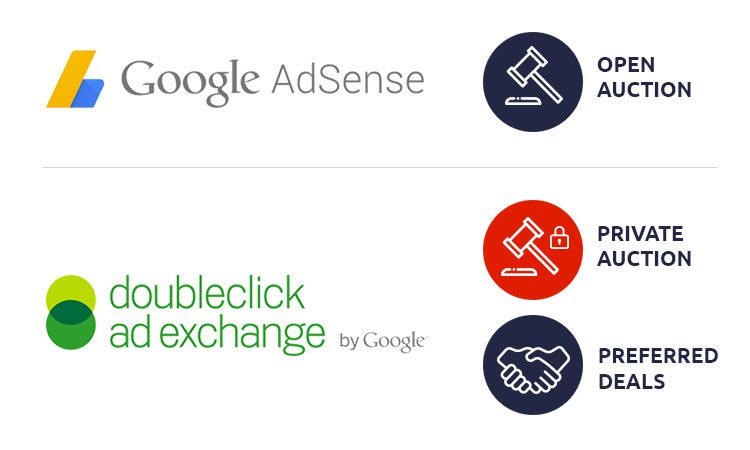AdSense vs Google Ad Exchange (AdX): what are the differences and which is better?

What are the differences between AdSense and Google Ad Exchange (AdX) and which is better? Many publishers may ask these questions when talking about these two popular monetization tools by Google. In this post, we will answer them.
Summary
- What is Google AdSense and how it works?
- What is Google Ad Exchange and how it works?
- AdSense vs Google Ad Exchange (AdX): what are the differences and which is better?
What is Google AdSense and how it works
AdSense is probably the most used monetization platform on the internet. Because of its high usability, this tool is generally considered a valuable resource for those who own a website and want to make money out of it with minimum effort.
On its support page, Google describes AdSense as “a free, simple way to earn money by displaying targeted ads next to your online content”. It’s a platform – technically it’s an ad network – that allows publishers to sell their inventory through an auction. Ads can be targeted based on the website content or the user features, and publishers earn from clicks and ad impressions.
It’s really simple to access the AdSense program. All you have to do is Create a Google AdSense Account, add some code on the website and that’s it, Google will do all the rest. It’s this ease of use that makes AdSense so popular, especially (but not only) among small publishers.
What is Google Ad Exchange (AdX) and how it works
Google Ad Exchange (AdX) too is a monetization solution. It offers many more features than AdSense, but at the same time is way more complex to use.
AdX is Google’s premium ad exchange. This platform allows publishers to sell their inventory through real time auctions that involve many different players, such as ad networks (like AdSense itself), DSPs, retargeting companies, direct brands and so on. The more the competitors, the higher the winning bids. Therefore, this technology often maximizes publishers’ revenues.
AdSense vs Google Ad Exchange (AdX): what are the differences and which is better?
While both solutions provide access to millions of buyers, there are some important differences between these two tools. AdX offers many more options than AdSense, such as the ability to set up different kinds of deals – e.g. Preferred Deals for fixed CPMs with buyers or Private Auctions with floor prices with multiple buyers. It also provides more filters and blocks, for example for sensitive ad categories, and it offers much more flexible reporting, with the ability to create queries based on publisher-defined parameters or use a system query as a starting point. Last but not least, AdX gives publishers the ability to make their inventory available as branded, semitransparent, anonymous, or a combination of any pair of these options. Here you can find a list of the major differences between the two platforms.
So, which is better? Well, actually there isn’t a “better” solution. Rather, one platform can be better suited than the other depending on the publisher’s characteristics and needs. For example, as Google says on its support page: “Ad Exchange is built for publishers that require granular controls to avoid undermining their direct sales efforts. If you don’t have a significant direct sales business or if channel conflict is not a major concern for you, AdSense might be a better solution”.
And there’s also another aspect that publishers shouldn’t underestimate: AdX is very difficult to use. Compared to AdSense, which “works on its own” once integrated into the website, AdX needs continuous management and control in order to optimize performances and maximize publishers’ revenues.
That’s why, if you want to use Google AdX, it is important to work with qualified partners that can facilitate your access to the platform and help you manage its tools. Clickio is Google AdExchange partner: contact us if you want to know more about Google AdX and if you’re asking yourself if AdX is the right solution to monetize your website.
